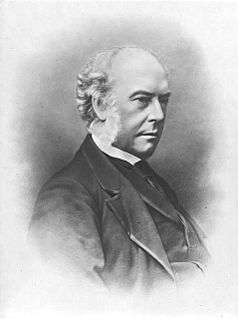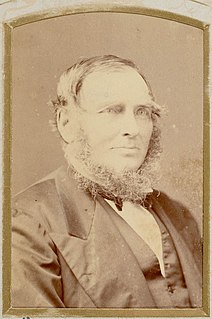Related Research Articles

Sir Charles Cowper, was an Australian politician and the Premier of New South Wales on five occasions from 1856 to 1870.
Sydney City was an electoral district for the Legislative Assembly in the Australian state of New South Wales from 1856 to 1859, when it was split into the electorates of East Sydney and West Sydney.
Members of the New South Wales Legislative Assembly who served in the third parliament of New South Wales held their seats from 1859 to 1860.</ref> The Speaker was Sir Daniel Cooper until 31 January 1860 and then Terence Murray.
Members of the New South Wales Legislative Assembly who served in the fourth parliament of New South Wales held their seats from 1860 to 1864:</ref> The Speaker was Terence Murray until 13 October 1862 and then John Hay.
Members of the New South Wales Legislative Assembly who served in the sixth parliament of New South Wales held their seats from 1869 to 1872.</ref> The 1869–70 election was held between 3 December 1869 and 10 January 1870 with parliament first meeting on 27 January 1870. There were 72 members elected for 52 single member electorates, 6 two member electorates and 2 four member electorates. Due to a change in the Constitution of New South Wales the maximum term of this parliament was reduced from 5 years to 3. However the assembly was dissolved after only 25 months after the third government of Sir James Martin lost a vote of supply. The Speaker was William Arnold.
Members of the New South Wales Legislative Assembly who served in the eighth parliament of New South Wales held their seats from 1874 to 1877.</ref> The 1874–75 election was held between 8 December 1874 and 12 January 1875 with parliament first meeting on 27 January 1875. There were 72 members elected for 52 single member electorates, 6 two member electorates and 2 four member electorates. During this parliament the number of graduates of Sydney University exceeded 100 and the seat of University of Sydney was created. The maximum term of this parliament was 3 years and the assembly was dissolved after 34 months. Premiers during this parliament were Sir John Robertson 9 February 1875 till 22 March 1877 and from 17 August 1877 and Sir Henry Parkes 22 March 1877 till 17 August 1877. The Speaker was William Arnold until his death on 1 March 1875 and then George Allen.
George Oakes was an Australian pastoralist and politician. He was a member of the New South Wales Legislative Council for two periods between 1848 and 1856 and again between 1879 and 1881. He was also a member of the New South Wales Legislative Assembly for two periods between 1856 and 1860 and again between 1872 and 1874.
Orange, an electoral district of the Legislative Assembly in the Australian state of New South Wales, has had two incarnations, the first from 1859 to 1920, the second from 1927 to the present.
The 1856 New South Wales colonial election was to return 54 members of Legislative Assembly composed of 34 electoral districts with 18 returning 1 member, 13 returning 2 members, two returning 3 members and one returning 4 members, all with a first past the post system. In multi-member districts, because each voter could cast more than one vote, it is not possible to total the votes to show the number of voters and voter turnout in these districts is estimated. 8 members from 6 districts were returned unopposed.

Charles Moore was an Irish-born Australian politician.
Durham, an electoral district of the Legislative Assembly in the Australian state of New South Wales, was created in 1856 and abolished in 1859. It was recreated in 1880 and abolished in 1920.
The 1901 New South Wales state election was for 125 electoral districts, with each district returning one member. The election was conducted on the basis of a simple majority or first-past-the-post voting system. In this election, in 32 electorates the winning candidate received less than 50% of the votes, while 13 were uncontested. The average number of enrolled voters per electorate was 2,764, ranging from Wentworth (1,706) to Willoughby (4,854).
A by-election was held for the New South Wales Legislative Assembly electorate of Orange on 4 November 1863. The by-election was triggered because James Martin had replaced Charles Cowper as Premier, establishing his first ministry. While the title of Premier was widely used to refer to the Leader of Government, it was not a formal position until 1920 and the Premier also held a formal position in the cabinet, in Martin's case this position was Attorney-General. Such ministerial by-elections were usually uncontested and on this occasion, Peter Faucett (Yass), William Forster and Arthur Holroyd (Parramatta) were unopposed. The two other ministers, Geoffrey Eagar and John Wilson were easily re-elected, with more than 90% of the vote.
East Maitland, an electoral district of the Legislative Assembly in the Australian state of New South Wales was created in 1859 and abolished in 1904.
East Sydney, an electoral district of the Legislative Assembly in the Australian state of New South Wales was created in 1859 and abolished in 1904.
A by-election was held for the New South Wales Legislative Assembly electorate of East Sydney on 10 November 1859 because the Cowper government was defeated, causing Charles Cowper to resign his commission as Premier and Colonial Secretary and he resigned from parliament the following day. The second vacancy was caused because John Black had been appointed Secretary for Lands in the new Forster ministry,
A by-election was held for the New South Wales Legislative Assembly electorate of East Sydney on 20 January 1860 because Charles Cowper had resigned from parliament on 26 October 1859, but was re-elected at the resulting by-election, having been nominated without his consent.
A by-election was held for the New South Wales Legislative Assembly electorate of East Sydney on 17 February 1865 because Charles Cowper had been appointed Premier and Colonial Secretary, forming the fourth Cowper ministry. Such ministerial by-elections were usually uncontested however on this occasion a poll was required in East Sydney, The Glebe and West Sydney. Each minister was comfortably re-elected. Only The Paterson was uncontested.
A by-election was held for the New South Wales Legislative Assembly electorate of The Glebe on 17 February 1865 because Thomas Smart had been appointed Colonial Treasurer in the fourth Cowper ministry. Such ministerial by-elections were usually uncontested however on this occasion a poll was required in East Sydney, The Glebe and West Sydney. Each minister was comfortably re-elected. Only The Paterson was uncontested.
A by-election was held for the New South Wales Legislative Assembly electorate of West Sydney on 18 February 1865 because John Darvall had been appointed Attorney General, and John Robertson had been appointed Secretary for Lands in the fourth Cowper ministry. Such ministerial by-elections were usually uncontested however on this occasion a poll was required in East Sydney, The Glebe and West Sydney. Each minister was comfortably re-elected. Only The Paterson was uncontested.
References
- 1 2 "Sir Charles Cowper [1] (1807–1875)". Former Members of the Parliament of New South Wales . Retrieved 6 September 2020.
- ↑ "Writ of election: East Sydney". New South Wales Government Gazette (38). 1 March 1867. p. 581. Retrieved 7 September 2020– via Trove.
- ↑ Green, Antony. "1867 East Sydney by-election". New South Wales Election Results 1856-2007. Parliament of New South Wales . Retrieved 7 September 2020.